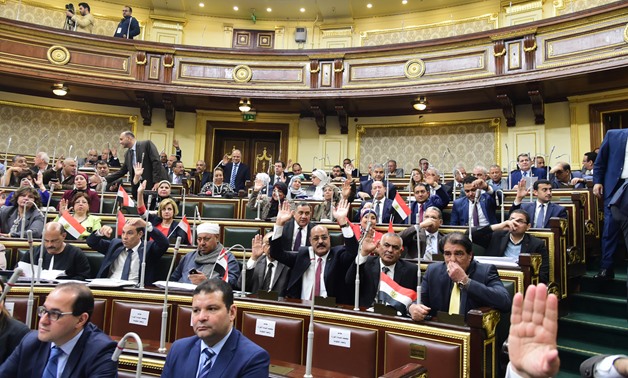
Parliament vote on constitutional amendments - photo by Khaled Mashaal
CAIRO – 16 April 2019: The Egyptian parliament convened Tuesday a plenary session to discuss the proposed constitutional amendments ahead of voting on the articles one by one.
House of Representatives Speaker Dr Ali Abdel Aal said Tuesday the parliament has done its best, and has created a platform for discussing the amendments during the societal dialogue sessions held over the past weeks.

Parliament vote on constitutional amendments - photo by Khaled Mashaal
During the session, the speaker said the efforts were exerted out of a wish to reach stability and eventually development.
"Today we come to the end of a long road of reviewing the constitutional amendments which started in February," he said.
The House has abided over two months by the constitution and the parliamentary rules with the aim of carrying out its national duty in full, he added.
 Parliament vote on constitutional amendments - photo by Khaled Mashaal
Parliament vote on constitutional amendments - photo by Khaled Mashaal
The House of Representatives Constitutional and Legislative Affairs Committee Tuesday asserted that the proposed constitutional amendments are “key steps” toward developing the Egyptian constitutional system and fall within democratic practicing and improving the constitutional structure of the country's political system.
Committee Chairman Baha el-Din Abu Shokka said the proposed amendments aim to strengthen the state and its institutions and enhance democratic values.
The suggested amendments were mostly in line with the views of the participants in the hearing sessions and a large part of the texts were formulated upon consensus among the committee members, he added.
Ali Abdel Aal further explained that the proposed amendments represent a practice of what is known by the created [formed] authority, which amends one or more articles of the constitution, rather than re-drafting the whole articles of the constitution, which is known as constituent authority.
 Parliament vote on constitutional amendments - photo by Khaled Mashaal
Parliament vote on constitutional amendments - photo by Khaled Mashaal
“There is a big difference between constituent authority and the created one. The public gets confused out of their belief that the proposed constitutional amendments are going to change the whole constitution which is definitely wrong,” Aal said today.
Moreover, Parliamentarian Mohammed el-Swedi showed his approval to the proposed Constitutional amendments, explaining that “the amendments are necessary and that the constitution is not a holy book to not be changed.”
Swedi affirmed that the 4-year term is not sufficient, so we [Parliamentarians] proposed to extend it by another two years; giving examples by other countries around the world that have their presidential terms exceeding 4 years such as Russia, Kyrgyzstan, India, and others.
Parliamentarian Saeed Hassasseen denied all news claiming that the proposed Constitutional amendments are not reviewed or revised enough.
Hassassin assured that more than 150 parliamentarians proposed these amendments where each article was carefully revised before setting it to public vote.
“Parliament played a patriotic role; history will always remember it. All Egyptians deep down want to amend some articles in the Constitution. Parliament’s sessions reflected a democratic atmosphere where all shared their opinions and thoughts neutrally,” Hassassin stated.
Member of Parliament Mostafa Bakry said he supports the amendments, but disagrees with re-introducing the upper chamber “Shura Council” as unnecessary, adding “either we cancel it, or assign it tasks…we should not waste our money.”
However, Spokesperson Ali Abdel Aal said that assigning the Shura Council with certain tasks and specialties “would require re-structuring the current political system, and this is unsuitable now.”
During the session, a number of political parties and members voiced their approval and disapproval to the amendments.
At the end of the plenary session, a roll-call vote from each parliamentarian will be counted for the amendments.
MENA contributed to this report
Comments
Leave a Comment